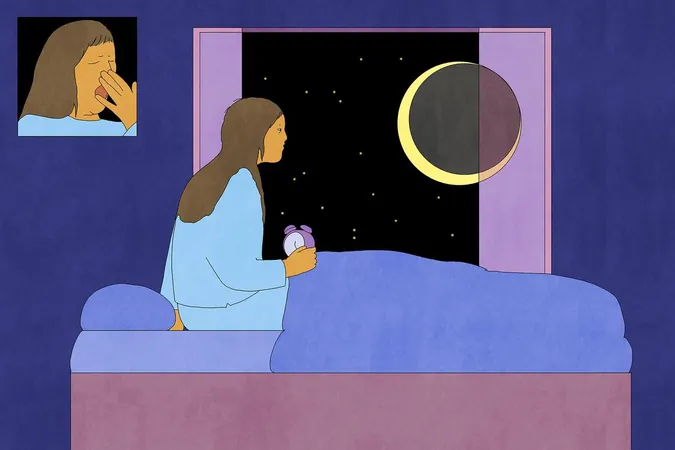
Are You Tired? Discover the Signs of Sleep Deprivation and How to Combat It!
2025-01-21
Author: Rajesh
NEW YORK – Sleep deprivation has become an alarming issue for many adults in the United States, with detrimental effects on both physical and mental health. Recent research indicates that chronic lack of sleep increases the risk of serious conditions like cardiovascular disease, high blood pressure, and metabolic disorders. Furthermore, inadequate sleep can make individuals more susceptible to infections and has been linked to mental health disorders such as depression and anxiety.
On the flip side, a consistent good night's sleep can significantly reduce stress, enhance cognitive function, and boost your immune system.
How Much Sleep Do You Really Need?
Experts recommend that adults aim for seven to nine hours of restful sleep each night, as suggested by the Centers for Disease Control and Prevention (CDC). However, approximately one in three adults in the U.S. falls short of this guideline, logging less than seven hours nightly. This trend seems to be worsening, as Americans are working longer hours and increasingly glued to screens emitting blue light, impacting their ability to wind down before bedtime.
Dr. Charlene Gamaldo, a neurologist at Johns Hopkins University School of Medicine, explains how blue light interferes with natural sleep cycles by signaling the brain to stay alert. "As we become more and more plugged in, this becomes more and more of an issue," she noted.
Sleep deprivation isn’t solely about the number of hours spent asleep; it can stem from both the quantity and quality of sleep. A person may be considered sleep-deprived if they consistently receive less sleep than their body needs over an extended period. This is often exacerbated by lifestyle choices and certain medical conditions such as sleep apnea and insomnia.
Drowsiness vs. Sleep Deprivation: Knowing the Difference
Recognizing the difference between simple drowsiness and true sleep deprivation can be challenging without proper medical assessment. If you occasionally struggle with fatigue, a good night's rest might resolve the issue. However, chronic sleep deprivation manifests with more urgent symptoms: difficulty concentrating, greater irritability, and increased chances of dozing off during activities like driving.
A helpful tip from Dr. Eric Olson, a sleep specialist at the Mayo Clinic, is to evaluate sleep on non-working days, such as weekends or vacations. This can provide insight into how much sleep your body genuinely needs versus what your usual schedule provides.
Strategies to Sleep Better
Addressing sleep issues involves pinpointing the underlying cause. Cognitive behavioral therapy has proven effective for those with insomnia, while individuals suffering from sleep apnea may find relief with tools like continuous positive airway pressure (CPAP) machines. Regular exercise, along with avoiding stimulants like caffeine and keeping alcohol consumption in check, can also play a critical role in improving sleep quality.
While over-the-counter sleep aids may seem tempting, experts caution they often merely mask underlying problems instead of solving them. Prescription sleeping pills may assist those facing occasional sleeplessness but shouldn't be used daily due to potential dependency risks—particularly with medications like benzodiazepines.
To naturally enhance sleep quality, Dr. Sarah Lou Clever from Johns Hopkins University suggests implementing behavioral changes. Swapping out late-night screen time for reading, engaging in light stretching or exercise before bed, and practicing meditation can significantly contribute to better sleep.
The Importance of Prioritizing Sleep
Ultimately, ensuring adequate rest is vital. "Sleep is one of those things that people need to prioritize for it to happen," Dr. Clever emphasizes. Many individuals find it challenging to carve out this time, but making conscious decisions to prioritize sleep can lead to a healthier, more vibrant life.
If you’re tired of feeling tired, it’s time to make sleep a priority!

 Brasil (PT)
Brasil (PT)
 Canada (EN)
Canada (EN)
 Chile (ES)
Chile (ES)
 Česko (CS)
Česko (CS)
 대한민국 (KO)
대한민국 (KO)
 España (ES)
España (ES)
 France (FR)
France (FR)
 Hong Kong (EN)
Hong Kong (EN)
 Italia (IT)
Italia (IT)
 日本 (JA)
日本 (JA)
 Magyarország (HU)
Magyarország (HU)
 Norge (NO)
Norge (NO)
 Polska (PL)
Polska (PL)
 Schweiz (DE)
Schweiz (DE)
 Singapore (EN)
Singapore (EN)
 Sverige (SV)
Sverige (SV)
 Suomi (FI)
Suomi (FI)
 Türkiye (TR)
Türkiye (TR)
 الإمارات العربية المتحدة (AR)
الإمارات العربية المتحدة (AR)